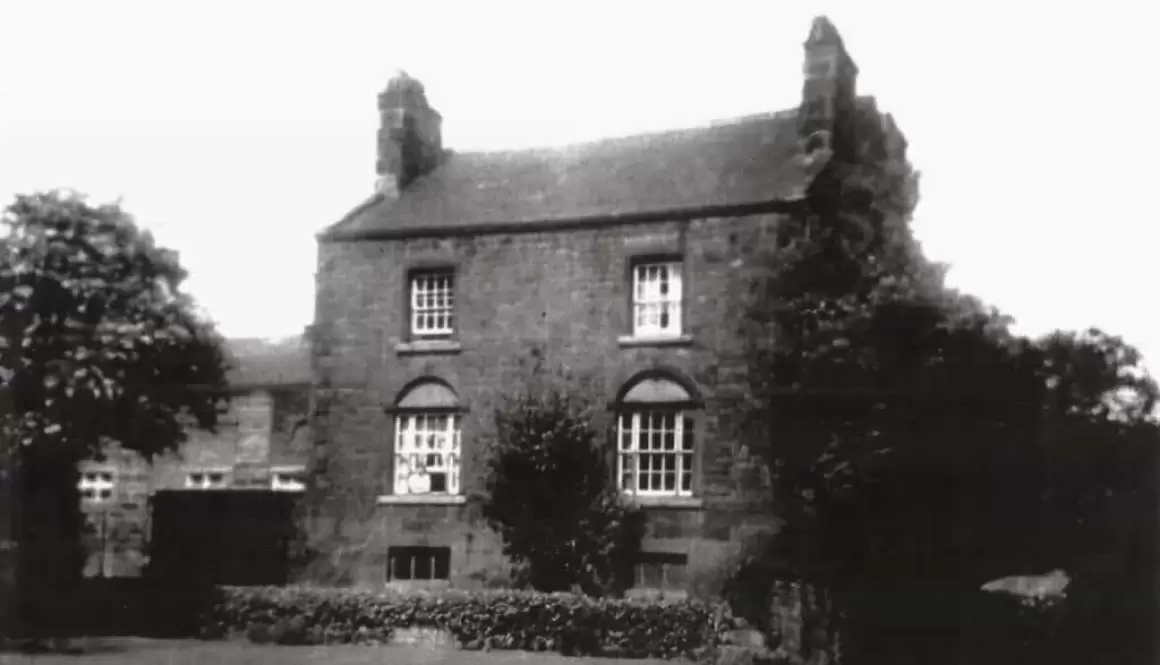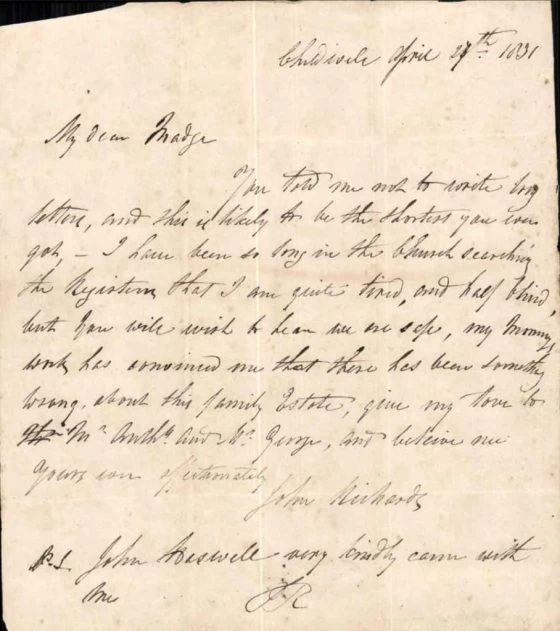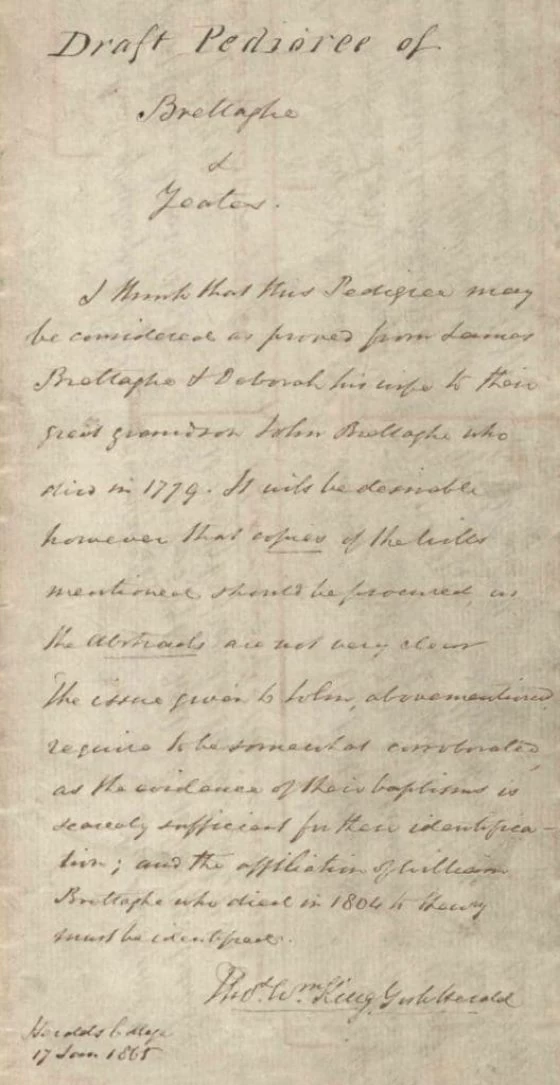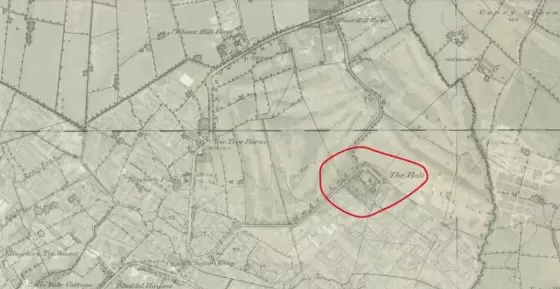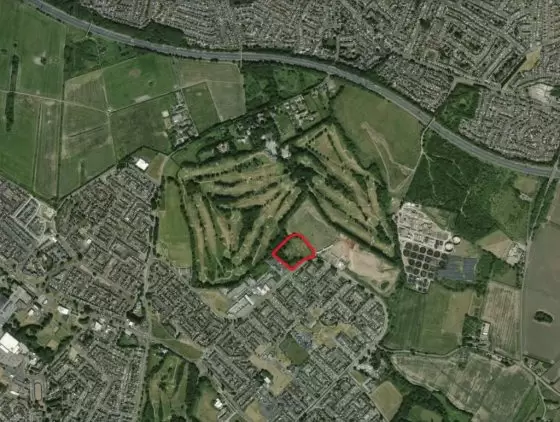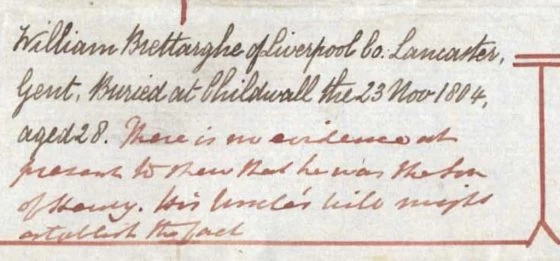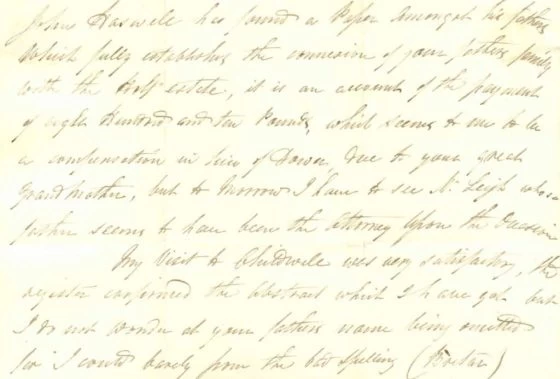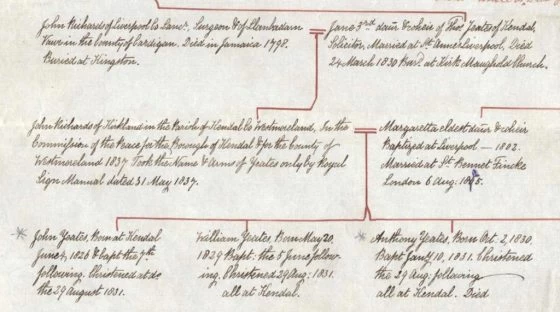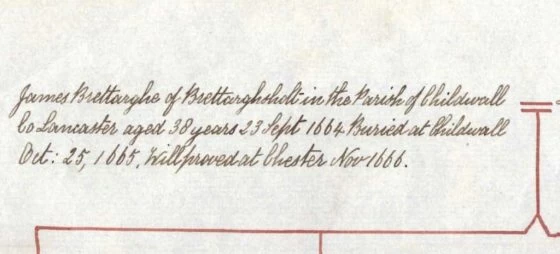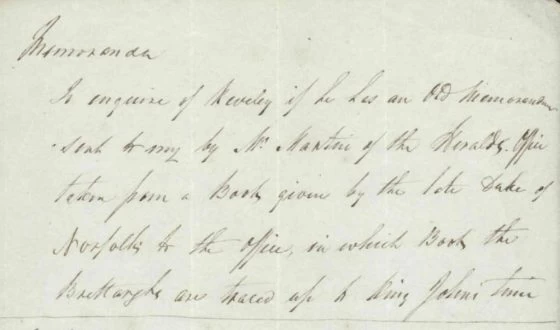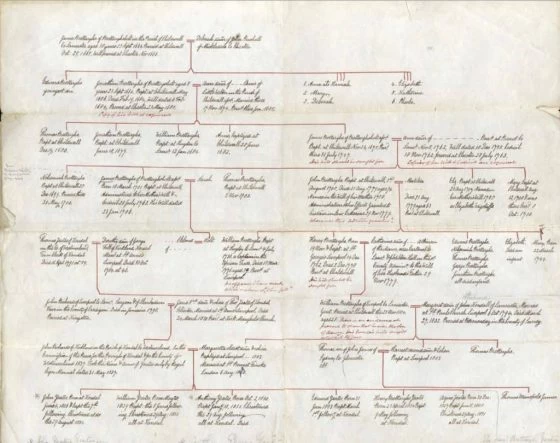The Brettargh Family of Liverpool
The Brettargh Family of Liverpool
Overview
I have used family correspondence and memoranda of pedigree from the College of Arms to trace the family back to James Brettargh who died in 1664. The original copies of all of these documents were originally in our possession, but have now been donated to the Kendal Record Office, in Cumbria, along with all the other Yeates related correspondence and diaries, and made available to the public. The documents referred to in this article have been made available for download at the end of this article.
For information about the Brettargh family earlier than that date I have relied upon an excellent article written by R Stewart-Brown MA FSA entitled the Brettarghs of Brettargh Holt in Woolton. This article was published in Vol 88 of Transactions 1936 and the information therein is reproduced with the kind permission of the editor and council of the Historic Society of Lancashire and Cheshire.
Margaretta Brettargh
“Madge” Brettargh as she was known to her family was born in Liverpool, England on 6 August 1802, the eldest daughter of William Brettargh and Margaret Kendall. Her story is told here.
The Brettargh family can trace their heritage in Liverpool back to the twelfth century, or to the reign of King John as her husband, John Richards, describes it in one of his letters to his wife.
This page is an overview of the Brettargh Family. I have deliberately avoided trying to document the direct line of succession. That information is available in other places including my tree on Ancestry.co.uk. Instead I wanted to focus on the connection to the family and also provide some anecdotes about the rise and fall of the fortunes of this family over the centuries.
Childwall
The letter opposite is dated April 27th 1831. It is a letter from John Richards to his wife Margaretta “Madge” Brettargh. John Richards is in Childwall, Liverpool, which was the original home of the Brettargh family since the twelfth century.
It seems that John had gone to Liverpool to try to find a connection between his wife’s father William Brettargh and the Brettargh family from Brettargh Holt which is near Childwall. Maybe, he just wanted to do a little family history research or perhaps he hoped to enhance their social standing by association with a notable and armorial family. His letter transcribes as follows:
Childwall April 27th 1831
My dear Madge
You told me not to write long letters, and this is likely to be the shortest you will ever get. I have been too long in the church searching the Registers that I am quite tired, and half blind, but you will wish to hear me safe, my morning’s work has convinced me that there is something wrong about this family Estate. Give my love to Mr Anthony and Mr George and believe me,
Yours ever affectionately
John Richards
PS John Haswell very kindly came with me. JR
Draft Pedigree of Brettargh and Yeates
The draft pedigree opposite shows the confirmation by the York Herald, Rev William King, that the attached pedigree may be considered to be proved subject to the supply of some additional documentary evidence. The transcription reads as follows:
“I think that this pedigree may be considered as proved from James Brettarghe and Deborah his wife to their great grandson John Brettarghe who died in 1779. It will be desirable however that copies of the wills mentioned should be procured, as the abstracts are not very clear.”
“The issue given to John, abovementioned require to be somewhat corroborated as the evidence of their baptisms is scarcely sufficient for their identification; and the affiliation of William Brettarghe who died in 1804 to Henry must be identified.”
Rev Wm. King, York Herald
Heralds College
17 Jan 1865
As the Pedigree was eventually accepted by the College of Arms, I assume that the deficiencies identified by the York Herald were rectified.
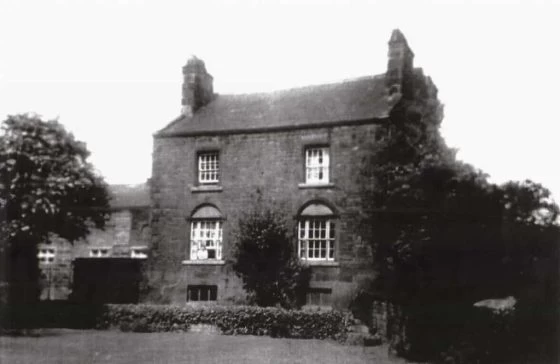
Holt Hall Farm, Woolton, Liverpool
Brettargh Holt was the ancestral seat of the Brettargh family. It has now been demolished, but it was located in what is now the Childwall area of Liverpool. All Saints Parish Church in Childwall contains many memorials and graves of the Brettargh family.
The original Brettargh Holt was located on about 300 acres of land to the west of Tarbock Hall and north of Childwall Brook on land that is now occupied by Childwall Golf Club.
The original building became known as Holt Hall Farm and has now been demolished.
Location of Brettargh Holt
“The Holt” is located on the right of the map and is circled in red ink.
The map has been created by overlaying the 1840 OS 6 inch to the mile map over contemporary satellite imagery and reducing the opacity of the top map to allow the satellite imagery to be visible below this map.
Location of Brettargh Holt Site Today
The location of Brettargh Holt has been identified in red ink on the satellite photograph opposite.
It is immediately adjacent to Childwall Golf Club which can be clearly seen to the north west, and the M62 is clearly visible at the top of the photo.
William Brettargh
Opposite is a small extract of the pedigree that was submitted to the York Herald at the College of Arms. William Brettargh was Madge Brettargh’s father and died when she was just two years old, just like her husband’s father died when he was also aged two. No wonder this couple want to establish their pedigree!
The Herald’s comments are marked on the pedigree in red ink and read as follows:
“There is no evidence at present to show that he was the son of Henry. His Uncle’s will might establish the fact.”
We have to assume that these deficincies were rectified as the Draft Pedigree was eventually accepted by the College of Arms.
Connecting the two families
It seems that John Richards and John Haswell continued their search of the parish registers and gravestones in All Saint’s Church in Childwall. John Richards writes again to his wife and an extract is transcribed below.
John Haswell has found a paper amongst his fathers, which fully establishes the connexion of your father’s family with the Holt Estate, it is an account of the payment of eight hundred and ten pounds, which seems to me to be a compensation in lieu of Dower, due to your great grandmother, but tomorrow I have to see it. Leigh whose father seems to have been the attorney upon the question.
My visit to Childwall was very satisfactory, the register confirmed the abstract which I have got, but I do not wonder at your father’s name being omitted for I could barely ? from the bad spelling (Bretar).
Pedigree
This is the section of the Brettargh Pedigree which includes John Richards and it describes John Richards as follows.
John Richards of Kirkland in the Parish of Kendal, Co Westmorland. In the Commission of the Peace for the Borough of Kendal & for the County of Westmorland 1837. Took the name & Arms of Yeates only by Royal Sign Manual dated 31 May 1837.
The Pedigree does not include George H B Yeates who was not born until 1841, so it was reasonable to assume that the Pedigree was created between 1837 and 1841. But it is a mystery why the comments on the pedigree by the York Herald are dated 1865, unless George Yeates wanted to verify that the heraldry to be used in the stained glass window, which he was installing in Holy Trinity Church, Kendal in memory of his parents was correctly designed in terms of the heraldic shields.
Memoranda
I found the document opposite amongst John Yeates’ papers. It is entitled Memoranda, but reads very much like a To Do list that we would use today. It reads as follows:
To enquire of Reveley [his solicitor] if he has an old Memorandum sent to my [father] by Mr Martin of the Heralds Office, taken from a book given by the late Duke of Norfolk to the office in which the Brettarghs are traced up to King John’s time.
Information included below about the Brettargh Family before this date has been derived from an article in Vol 88 of the Transactions of the Historic Society of Lancashire and Cheshire, and is reproduced with the kind permission of the editor and council of the Historic Society of Lancashire and Cheshire.
The Brettargh Family
The Brettargh family can trace their history back to 1180, when John, Constable of Chester granted the “vill” of Brettargh to william de Suonis. In 1324 William de Huyton settled Brettargh and about 100 acres of land on Avice, who was thought to be either his daughter or his discarded wife. At this time, Avice was the wife of Roger the Walker, and together they became de Brettargh.
By the end of the fifteenth century the family pedigree can be traced fairly accurately to current times. Though never a family of the front rank, the Brettarghs of Brettargh Holt were of prominence and position in Lancashire.
Probably never a wealthy family, but fortunes began to go downhill in the seventeenth century largely due to the extravagance and recklessness of Nehemiah Brettargh and his son James. Further heavy liabilities were incurred by James grandson of James. He sold the valuable property at Aigburth, which had come to the family in the sixteenth century by the marriage with the heiress of John Toxteth.
The entail of “The Holt” was broken and the ancestral estates heavily mortgaged. Before his death in 1747 James Brettargh seems to have been forced to leave “The Holt”, and he was the last Brettargh to live there. About 1790, The Holt estate was thrown into Chancery, for non-payment of a mortgage.
Original Documents
This article has been prepared from the Yeates Family Documents and Diaries, the original copies of these documents have now been donated to the Kendal Record Office and have been made available to the public for viewing or download.
